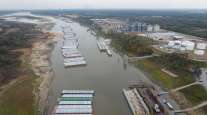Mississippi House Panel Rejects Sales Tax Hike for Infrastructure

Mississippi's Legislature rejected a sales tax hike for infrastructure improvements despite a think-tank report stating an inadequate transportation system is costing residents $2.25 billion per year.
The bill had the support of the state Senate but was rejected by the House. A 60% supermajority in each chamber is needed to pass a tax increase.
The report, produced by The Road Information Program, based its figure on estimated vehicle operating costs, congestion delays and traffic crashes.
With the Legislature due to adjourn April 24, the decision by committee Chairman Charles Busby not to keep fighting against the will of his members means that Mississippi’s roads and bridges, which were given a C- by the American Society of Civil Engineers, won’t receive additional funding before 2017.
“Our interstates are in generally good condition,” said Hal Miller, president of the Mississippi Trucking Association, whose organization supports increased infrastructure funding. “Our bigger issues are on our state roads, highways and bridges. Some of them could stand some expansion due to our constant growth.
"I-10 is pretty heavily congested. The same is true in the Jackson area, in the north near Memphis [Tennessee], and in the northeast corner of the state near Tupelo. On Highway 6 that runs east-west from the Mississippi River straight across to the northeast corner, the section between Clarksville and Batesville has some bridges that are already posted [for lower weight limits]. That has created some issues, particularly for the agricultural folks who have to really go out of their way to get their goods moved.”
A separate report by the Mississippi Economic Council found that the state faces a backlog of $6.6 billion in funds needed to address necessary transportation repairs and improvements. Polling conducted by Mason-Dixon Polling & Research for MEC showed that 85% of voters believed more funding was needed for transportation and 61% supported a reasonable increase in taxes and fees if the revenue was spent on infrastructure.
“Making an investment to protect Mississippi’s transportation system is vitally important,” MEC Executive Vice President Scott Waller said. “MEC, along with a large coalition of organizations that support increased funding, will continue to work with legislative leaders going forward to address this issue in order to ensure all Mississippians have a safe and reliable transportation system at both the state and local level.”
Mississippi’s 18.4 cents-per-gallon fuel tax hasn’t been raised since 1987. Department of Transportation Executive Director Melinda McGrath had identified a $526 million annual funding shortfall, which included a significant chunk for expanding the state’s infrastructure. MEC had called for $375 million.
Busby’s proposed sales tax hike from 7% to 9%, with an exemption for groceries, would have covered MEC’s request. Senate Transportation Committee Chairman Willie Simmons had proposed a $441 million plan based on increases in fuel taxes and Department of Motor Vehicle fees.
Gov. Phil Bryant had said that he supported infrastructure improvements, but only if their cost was offset by a corresponding tax cut.




